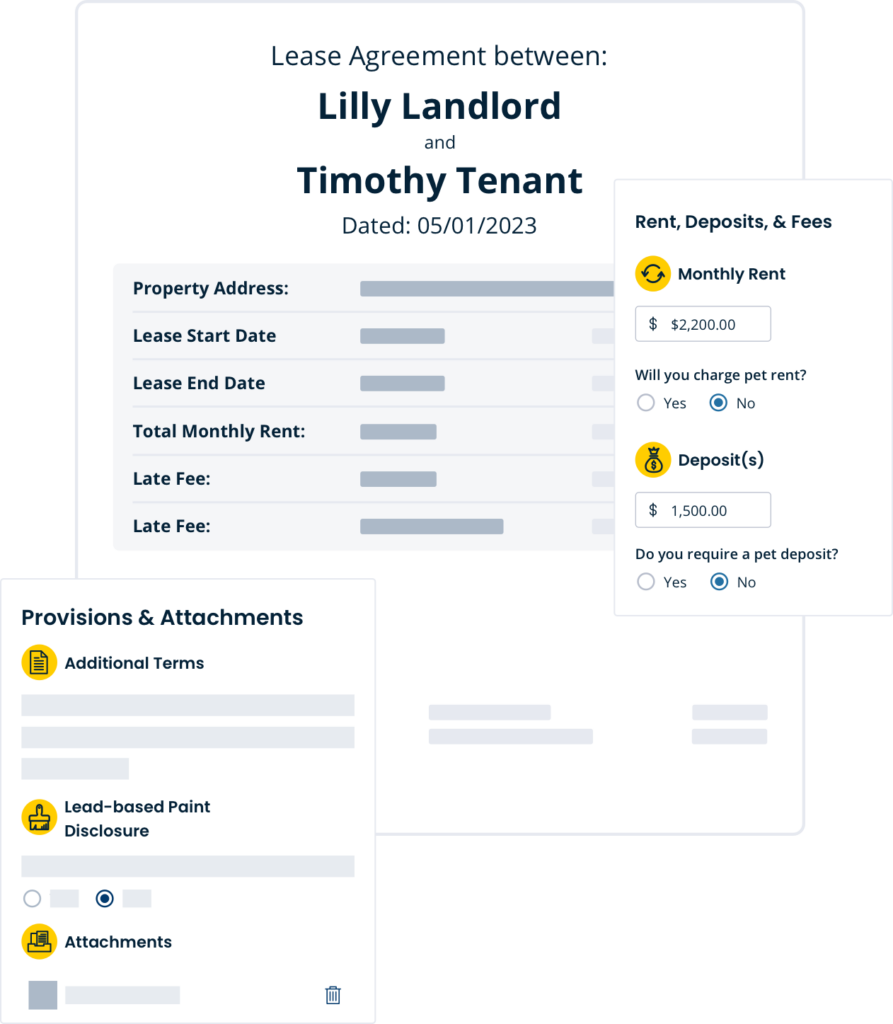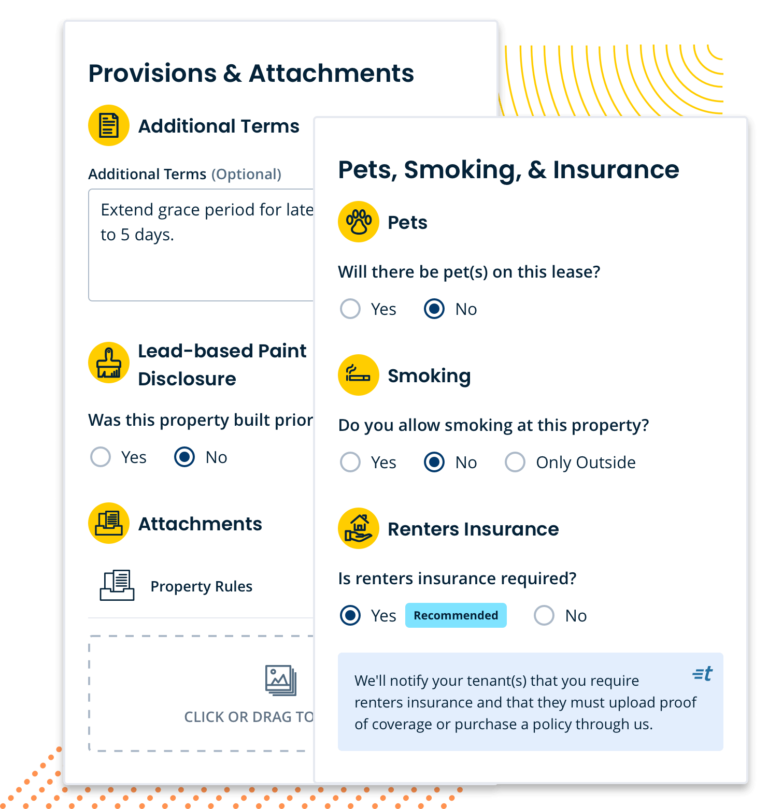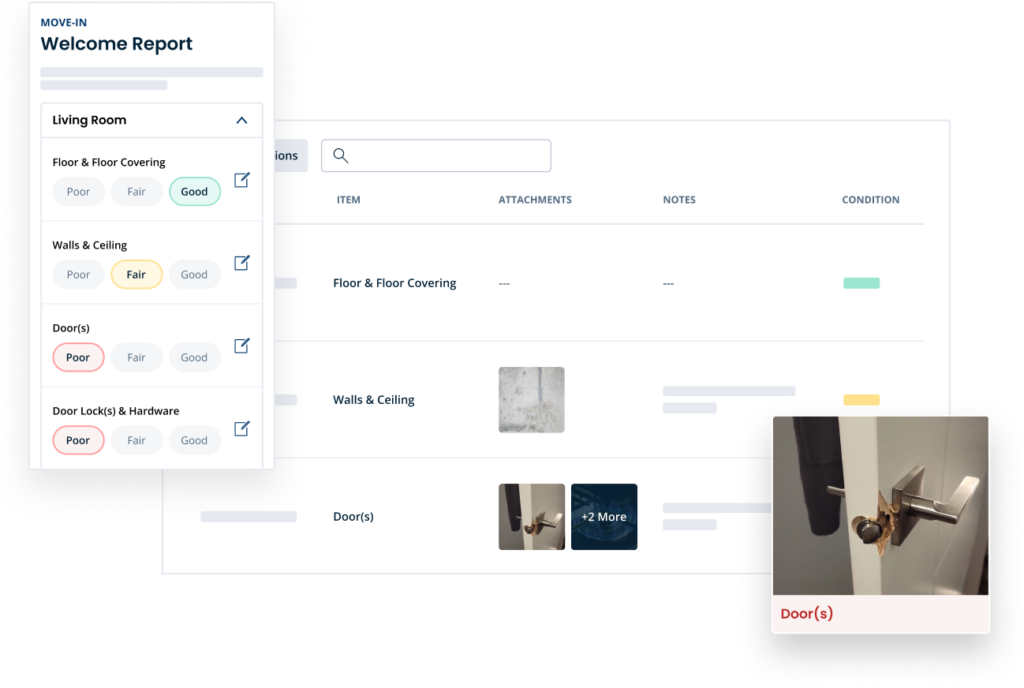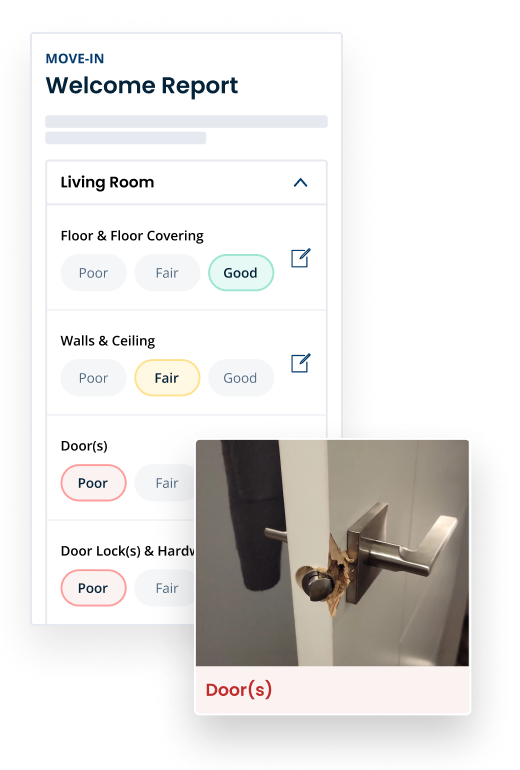Rental Lease Agreement
The easiest, fastest way to build a lease
Our fill-in-the-blank tool simplifies customizing and adjusting your lease agreement on your own, ensuring compliance with your state’s specific laws. E-signatures included.

More affordable than a lawyer.
More reliable than your repurposed lease.
Select your rental’s state, fill in the important details, and generate a legally binding lease to send to your tenants within minutes.

Rental Lease Agreement Templates, Forms & More
Whether you have one or 1,000 doors, use TurboTenant’s intuitive toolset to streamline your entire process for free.
Build a listing in less than 10 minutes, then push it across the web to collect high-intent leads.
Gain insight into potential tenants’ rental, financial, criminal, and eviction history — for $0 on your end.
Get easy tracking, automatic reminders and late fees, accounting, and autopay. Free for landlords.
Customize Your State-Specific Lease Agreement Template
An essential part of the property management process, our comprehensive rental agreements keep both the landlord and tenant covered. You only need to fill out the standard information and any unique details about your rental unit.
- Lease Specifics: Confirm the address and tenancy term, including start date and end date
- Rent, Deposit, & Fees: Set the monthly rent amount, relevant pet fees, security deposit, and the methods allowed to pay rent
- People on the Lease: Add all responsible parties as well as any additional occupants and their contact information
- Pets, Smoking, & Insurance: Define your pet policy, along with what’s allowed and what isn’t
- Utilities, Services, & Keys: List out what the property owner is responsible for, and what the tenant will cover
- Additional Terms: Add any provisions, rules, or addendums unique to your rental property and state laws
Set Up Your Rental Lease Agreement in a Few Short Steps
You’ve found the perfect new tenant, had them fill out a rental application, and now it’s time to set up your state-specific rental lease agreement. Whether you want a fixed-term lease or a short-term month-to-month lease, we have you covered from move-in to move-out.
Create your lease right in your TurboTenant account so you can keep everything in one place.
Fill out specifics like the terms of the lease, period of time, monthly rent, security deposit amount, late fees, who is on the lease, pet rules, renters insurance requirements, and the rent due date.
Customize your lease to include unique clauses like subletting, as well as rules, disclosures, or provisions that are specific to your residential property or local area.
Live in New York, Illinois, or Virginia? Our wizard includes the necessary steps to ensure complete lease compliance.
Preview your rental contract before you pay so you can ensure everything looks up to par.
Sign and send your written agreement for e-signatures right in your account (included at no extra cost).
Get Your Lease E-signed
Once you pay for your lease agreement, it’s signature time! You can seamlessly send it out to get signed electronically at no extra cost. Once signed, your binding contract will be securely stored in your TurboTenant account.

Pair your lease with a condition report. Tailored to your rental.
Protect yourself from any “he said, she said” conflicts and security deposit disputes by using TurboTenant’s move-in/move-out reports.
Customize your digital report. Send it to tenants for signatures. Then store it in your account for re-use and easy reference. Learn more.


Pricing
We offer one simple way to handle all the legal form needs for your rental real estate. Forget about reformatting old Word docs, dealing with a scanner, or fumbling with whiteout. We make it easy to provide written notice and legal documents for a huge range of common situations.
Premium Plan
Be confident with all the legal forms & tools you need as a professional landlord. Learn more about Premium.
-
Unlimited Lease Agreements
(Normally $59 per lease) - Unlimited Lease Addendums
- Unlimited Electronic Signatures
- Unlimited Document Storage
- Landlord Forms Pack ($199 Value)
Single Lease Agreement
Billed Once
Get a single-use rental lease agreement through TurboTenant.
Review Your Lease Before You Pay
We know you want to double- and triple-check your lease agreement before you pay. That’s why we’ve made it easy to review your rental agreement at any time during the process. You won’t be charged until you’re confident it’s ready.
WATCH THE VIDEO
Take a Look at the Best Customizable Lease Agreement Forms For Your Rental Property!
Free Rental Agreement Forms
TurboTenant simplifies the creation of state-specific lease agreements for landlords, ensuring legal compliance and clarity. With our Lease Agreement Generator and Templates, we provide a comprehensive solution that addresses local legal requirements and best practices, making the leasing process efficient and secure for both landlords and tenants. This tool is essential for navigating the complexities of rental laws with ease.
Lease Agreement FAQs
Does the lease agreement follow state-specific rental laws?
TurboTenant’s custom rental lease agreement templates were drafted by a team of landlords and law firms to ensure you are compliant and covered under federal laws and your specific state’s rental laws. Whether renting out a condominium in Florida or a single-family home in Texas, we have what you need to craft the perfect state-specific lease agreement.
What information can you customize on the TurboTenant lease agreement?
We include all of the information on a standard lease agreement, such as rental address, term lease, monthly rent amount, and security deposit, but you’ll also be able to add additional terms that might be specific to your rental property or local area. The lease agreement is also a great place to add house rules like quiet hours, parking, your pet policy, and how to approach late rent.
What do you write in a lease agreement?
A great lease agreement should outline every detail of the lease that the property owner and the renters are entering into. These details include contact information, the people on the lease, the smoking policy inside the rental unit, and what happens at the end of the lease. TurboTenant’s customizable lease agreements make it simple for landlords to craft the perfect document that will keep them compliant, help them avoid evictions, and streamline their rental business.
Join the 700,000+ independent landlords who rely on TurboTenant to create welcoming rental experiences.
No tricks or trials to worry about. So what’s the harm? Try it today!
